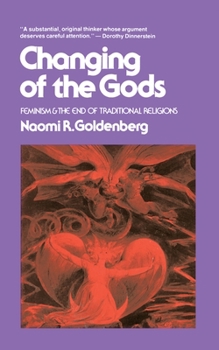Changing of the Gods: Feminism and the End of Traditional Religions
Select Format
Select Condition 
Book Overview
Feminism and the End of Traditional Religions
Format:Paperback
Language:English
ISBN:0807011118
ISBN13:9780807011119
Release Date:March 1980
Publisher:Beacon Press
Length:160 Pages
Weight:0.44 lbs.
Dimensions:0.4" x 5.4" x 8.0"
Customer Reviews
2 ratings
A Strong, Utopian, Feminist Classic in Religious Studies
Published by Thriftbooks.com User , 19 years ago
Naomi Goldenberg's 1979 Beacon volume, published in the same year as "The Spiral Dance" and "Drawing Down The Moon", is a strong, powerful manifesto for feminist power in the religious realm. "Changing of the Gods"is concerned to demonstrate that as more and more feminists become involved with religion, whether in the dominant Western fields of Judaism and Christianity, or in feminist witchcraft, there presence and power would irrevocably change the nature of religion, overthrowing Yahweh and Christ. Yet this overthrow for Goldenberg is not a *complete* destruction, but rather allows for their eventual return, once they have learned their place alongside female divinity. It is important to point out that Goldenberg also makes a strong case against the ability of feminists to reform, rather than destroy, Judaism and Christianity. For she sees, along with Mary Daly and others, an irreducible elements of sexism in the nature of Christ as male, or in the Torah and Talmud in Judaism. While somewhat respectful, perhaps her harshest criticism is reserved for reform feminists, whom she calls "naive" and "deluded." Rather, she re-reads and enlists Freud as exposing the essential father-son relationships at the heart of Judaism and Christianity in "Totem and Taboo", as well as "Moses and Monotheism." While sympathetic to Carl Jung, she openly takes him to task for his racism and essentialization of the "feminine." Interestingly, she extends the same argumentation against valorizing alleged "ancient matriarchal societies," lest those same models limit futures for women. But she does encourage dis-covering of experience over text and the formation of psychic mysticisms based on women's experiences as religiously important, and in turn this imgined "psychological polytheism" must be brought into tangibility--the imagination (including dreams), as so often it is in the Western esoteric tradition, must be seen as an organ of perception, rather than deception. Also, Goldenberg's notion of religion deserves clarification--it is not that she sees herself prophesizing literal death of powerful deities, rather she is a psychological reductionist--religion is a projection of psychology. But for her, this is no less powerful and meaningful for existing in the mind only, and so her work turns toward those recovering and re-visioning religion internally, individually, so that people begin to share the creative process of poesis rather than sharing the same myths and symbols. In this she points to the feminist thealogy and practice of witchcraft, as articulated by Starhawk and Z Budapest, as prophetic religion in action. Goldenberg's specifc contribution is to outline 12 phenomenological qualities of feminist witchcraft that challenge scholars and others who seek to examine it. in the end, these again are related to larger political concerns--men's distance from acts of child-rearing, feeding, and other early somatic aspects of parenting inculcate a distance and tran
paradigm shift
Published by Thriftbooks.com User , 21 years ago
This book will forever change the way women from the Christian tradition understand their relationship to the divine and the institutional church. In clear and succinct arguments, the author demonstrates why ameliorating strategies such as changing gender-biased language and opening the ordained priesthood to women will not change the nature of a church that has developed along patriarchal and misogynist lines rather than following the example of Jesus in his teaching concerning the equality of men and women in the eyes of God.






